Message from the Office of education
By Karla Luke
Every year, for the past 49 years, the National Catholic Educational Association (NCEA) has designated the last Sunday in January as the beginning of National Catholic Schools Week. Activities conducted throughout this special week are intended to raise the profile of the benefits of Catholic education in our communities and our nation. We remember and celebrate the courage of the early bishops who sought to create a school system whereby schools could pass on our Catholic faith through education to all future generations. We express our pillars of faith, excellence and service through daily living out our Catholic faith and values in our schools, focusing on each student reaching their highest potential and serving our communities.
The experience of a Catholic education was the most precious gift my parents gave to my brothers and me. My mother was a public-school teacher in the sixties and seventies, while my father was a postal employee. As you may know, these jobs were considered respectable jobs, but in no way were we considered wealthy. My parents sacrificed to keep all three children in Catholic schools from kindergarten through high school. The people we are today are primarily because of the partnership that existed between our family and our schools. Our parents and schools taught us the value of our faith, honesty, integrity, service and hard work.
National Catholic Schools Week is the most appropriate time to express our thanks to all who support Catholic Education in the Diocese of Jackson. We thank Bishop Joseph Kopacz for his assistance to our Catholic schools through his prayers, for providing resources for operations and for his presence at our schools to interact with administrators, staff and students. His actions signal the value of this ministry to the Catholic community and, most of all, to our students. We stress and affirm that the students in our schools today are our present and future church. In the Office of Catholic Education, we would also like to thank the diocesan staff and departments who continue to assist our schools by sharing their areas of expertise, including financial, communications, development, faith formation, stewardship, liturgy and in many other areas.
We thank the pastors and canonical administrators who lead our schools and support school administrators, staff and students. Our pastors and canonical administrators are in our schools frequently, providing examples of what it is to be prayerful and compassionate Catholic men. Their representation of how they live their vocation is sure to inspire our students as they grow and begin to discern their own vocations in life.
We thank our administrators, who tirelessly give of themselves to the success of their schools. The job of an administrator is often “eight days a week.” The success and safety of the students, the well-being of the faculty and staff, and parents’ satisfaction are constant goals before them. I have personally witnessed the energy and care they invest in their schools. We cannot thank them enough.
We thank our teachers who interact with our students on a daily basis. Teachers and teacher assistants, and students spend nearly 40 hours a week together. Teachers and their assistants have the closest personal relationships with our students and are committed to their academic success and personal growth and development. Our teachers are devoted to preparing their students for successful futures and helping them achieve their highest potential.
We thank our support staff: administrative assistants, facility managers, maintenance and janitorial crews and cafeteria staff. Without their contributions, our schools could not function effectively. We appreciate that every school employee must be committed to student success, no matter their job title.
I thank the Diocesan Council of Catholic Education for your continued commitment to Catholic education in the Diocese of Jackson. Your support has been unwavering.
Finally, to our students and families … we would not exist without your faith in Catholic education! We thank you for your dedication and for entrusting your most precious resources to our care. Please believe that we are constantly exploring ways to make our great schools even more excellent by yielding students who love and serve Christ and are positive, productive and contributing members of their communities.
The theme for National Catholic Schools Week this year is Faith … Excellence … Service. The annual theme chosen for this year by schools in our diocese is taken from Psalm 100:2, “Serve the Lord with Gladness.” One of the national pillars of Catholic schools is service. In the Diocese of Jackson, our students, teachers and administrators participated in many service projects this year. It is exciting to see how each school has served its communities. Please enjoy this issue and continue to keep all schools and the members they serve in your prayers. God bless you and thank you!
Updates
El camino sinodal revela un terreno común
Por Obispo Joseph R. Kopacz, D.D.
Entonces, ¿qué hay de nuevo en el Sínodo sobre la Sinodalidad? Hacia fines de 2021, el Papa Francisco había ordenado a la iglesia de todo el mundo que participara en el proceso que conocemos como el Sínodo.
A lo largo de 2022 cada diócesis y arquidiócesis, en una disposición u otra, respondió a la visión y directiva del Papa, puso en marcha el proceso bajo la mirada del Espíritu Santo y se produjo una síntesis de las alegrías y esperanzas y heridas del Pueblo de Dios, junto con un profundo deseo por todo lo que Jesús anhelaba para su iglesia.

A su vez, casi 200 arquidiócesis en los Estados Unidos por región, como corrientes de agua, se combinaron para formar un río que fluye en el documento de Síntesis Nacional que refleja el trabajo de aproximadamente 700,000 católicos. Este fue el trabajo inspirado de 2022.
Actualmente, todos los países han entrado en la Etapa Continental y Estados Unidos está asociado con Canadá. El objetivo es que más oración y diálogo refinarán las voces de casi un millón de católicos en los vecinos de América del Norte. Durante enero varios representantes de la Diócesis de Jackson participaron en el Escenario Continental. Lo que se produzca a este nivel irá a Roma para diálogo adicional y discernimiento, en anticipación a la Exhortación Apostólica escrita del Papa Francisco en 2024, fruto del Sínodo mundial.
La Iglesia Católica en los Estados Unidos y en Canadá están en el centro de la “cultura occidental”, una realidad que ofrece oportunidades y desafíos que varían significativamente de otras partes del mundo. Los enlaces a la Síntesis Nacional de cada país están disponibles para su edificación para apreciar mejor los temas comunes con nuestros vecinos del norte, y también las diferencias pronunciadas.
La población total de Canadá es significativamente menor que la de Estados Unidos y su población católica refleja esta realidad. Hay una gran población indígena en el oeste de Canadá, y el Papa Francisco modeló el espíritu de sinodalidad cuando visitó el año pasado para estar con aquellos que son tratados tan injustamente en sus internados, para escuchar, orar, honrar su cultura y expresar su dolor y el de la iglesia por el dolor que aún aflige al pueblo.
Por otro lado, la Provincia de Quebec en el Este es extremadamente secular y “hay un deseo de cambio urgente para recuperar, o preservar, lo que queda de relevancia y misión de la iglesia”.
En un grado u otro la Iglesia Católica en cada país está respondiendo a los impulsos del Espíritu Santo de reunirse en oración, discernimiento y diálogo respetuoso para ver, valorar las cosas que verdaderamente importan y servir con la mente y el corazón de Jesucristo.
El camino sinodal ha revelado el terreno común entre cada uno de nuestros países. Como el Papa Francisco modeló en Canadá entre los indígenas, hubo una gran importancia en ambas Síntesis Nacionales otorgadas a la virtud de escuchar. En el centro de ser una iglesia acogedora hay un corazón que escucha y mira con amor lo que es real.
“El valor de simplemente escuchar es un mensaje claro del proceso del Sínodo. Las personas deben poder hablar honestamente incluso sobre los temas más controvertidos sin temor al rechazo. Debemos estar abiertos a nuevas ideas y formas de hacer las cosas, aun cuando permanezcamos fieles a la tradición de la iglesia. La formación en la fe puede ayudarnos a desarrollar una mayor comprensión y crecer en la confianza en el Espíritu Santo que está obrando en todo lugar y tiempo”. (Síntesis de EE. UU.)
Repleto a lo largo de las Síntesis Nacionales está el llamado a la iglesia a cumplir la promesa de Jesús de una vida en abundancia. Debería haber una colaboración mucho mayor entre los ordenados y los laicos para continuar construyendo una cultura de confianza y transparencia entre el liderazgo de la iglesia y los fieles. Reconciliar las heridas del pasado, tender la mano a los marginados, acompañar a los marginados de la sociedad y atender el llamado al arrepentimiento y la conversión demuestra que el Reino de Dios está entre nosotros.
“Como el Papa Francisco nos recuerda con frecuencia, la sinodalidad no es un evento de una sola vez, sino una invitación a un estilo continuo de vida de la iglesia. Hemos dado los primeros pasos de este camino y hemos aprendido mucho; tenemos más que aprender y más que hacer como testigos de Cristo Jesús en nuestro tiempo.” (Introducción, Síntesis de EE. UU.)
Nota del Editor: Para encontrar la Síntesis del Sínodo Diocesano, Síntesis del Sínodo Nacional de Estados Unidos y los documentos del Estado Continental del Sínodo, por favor visite: www.jacksondiocese.org/synod.
Nothing can diminish the value of any human being, pope says
By Carol Glatz
VATICAN CITY (CNS) – No physical limitation or setback can diminish the value of any human being because each person is a unique and beloved child of God, Pope Francis said.
“We are not anonymous, we are not photocopies, we are all originals! And this is how we should be: originals, not photocopies,” he said during an audience at the Vatican Jan. 14 with members of the Pope John XXIII Community association.
“God knows us one by one, with our name and our face, which is unique,” he said.
“Certainly, we also have our limitations; some of us unfortunately have heavy limitations to bear,” the pope said. “But this detracts nothing from the value of a person: each one is unique, a son or daughter of God, each one is a brother or sister of Jesus.”
“A Christian community that welcomes the person as he or she is thus helps to see them as God does,” which is with a look of love, he said.
“God also sees our limitations, it is true, and helps us to bear them,” the pope said. “But God looks above all at the heart and sees every person in his or her entirety. God sees us as an image of Jesus, his only begotten son, and with his love he helps us to become more and more like him.”
The pope thanked the many families at the audience who offer foster care, emphasizing the importance of welcoming children and others into a loving home so they may be “regenerated by Christian love.”
These are men and women “who open the doors of their home to give a family to those who do not have one. A real family; not a job, but a life choice. In it there is room for everyone: minors, people with disabilities, the elderly, Italians or foreigners, and anyone who is looking for a fixed point from which to start again or a family in which to find themselves,” he said.
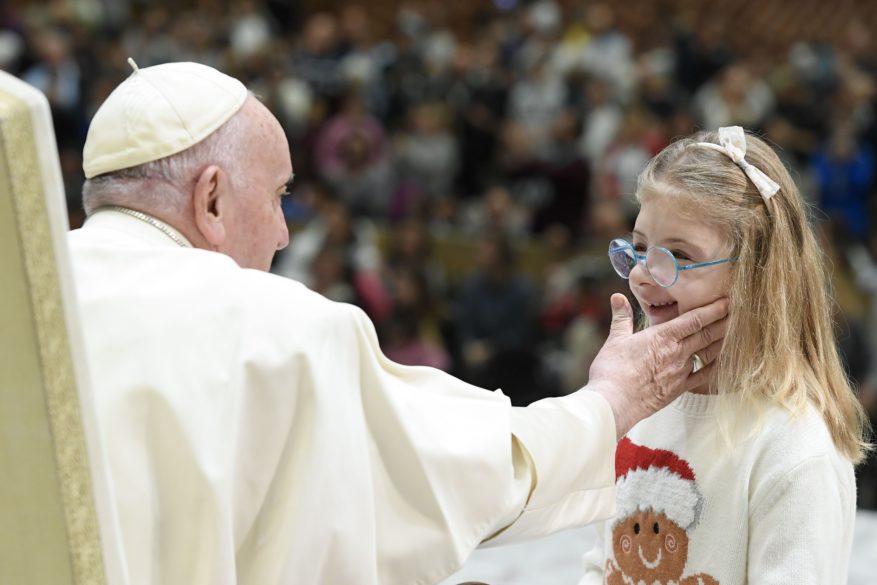
Pope Francis also thanked those who were unable to be at the day’s audience and had sent him their stories and questions.
“I would like to address some of you personally,” he said, such as Sara, 13, who fled Iraq and carries in her heart “the holy desire that children not be robbed of their childhood: May God help you achieve this!”
The people offered guidance to others without naming them, urging one child who “would like to see your grandmother who has gone to heaven,” to “speak with her in your heart and follow her good example, and one day you will see her again.”
Another young person, the pope said, “like many teenagers,” wrote about the “struggle to perceive the beauty of Mass.” But the pope responded, “Do not fear; at the right moment, the living Jesus will let you feel his presence.”
Pope Francis also thanked a “little friend, who remembers the innocents who are killed in the womb.”
Noting that many members of the community meet online to pray the rosary for peace every Sunday, the pope told them, “God listens to your prayer for peace, even if he does not seem to. God listens to it, and we believe that God gives us peace, immediately, today!”
How serious is laughter?
IN EXILE
By Father Ron Rolheiser, OMI
In a homily, Karl Rahner once commented that in the Beatitudes in Luke’s Gospel, Jesus makes a rather stunning statement. He says, ‘blessed are you who are now weeping, for you shall laugh.’ Rahner suggests that Jesus is teaching that our final state of happiness in heaven will not just lift us out of our sadness and dry away our tears, it will bring us to laughter, to “an intoxication of joy.” Laughter is integral to the final ecstasy.
Further still, if laughter constitutes the final happiness in heaven, then it should follow that whenever we are laughing, we are on good terms with reality. Laughter, Rahner submits, is part of the eternal praise of God at the end of time.

However, this can be glib and misleading. Not all laughter gives God praise and not all laughter suggests that we are on good terms with reality. Laughter can also be cheap, glib and wrong. The final joy of heaven is not always found at that place in a room where folks are cracking up with laughter.
There are many kinds of laughter and not all of them are healthy or godly. There is the laughter of drunkenness, of deadening your senses and jettisoning your moral compass and normal sensitivity. That kind of laughter will not be heard in some noisy little corner of heaven. Then there is the laughter of sarcasm, laughter that belittles others, that delights in others’ problems, and sees itself as superior. That too won’t be heard in heaven. Then there is the laughter that’s predicated on being insensitive and blind to the pain of others, that can enjoy itself even while Lazarus is starving just outside the door. The Gospels are clear as to where that kind laughter lands us. As well, there is the laughter of pure superficiality, laughter that comes easy because it really doesn’t care about anything. Such laughter, though harmless, speaks of nothing.
However there are other kinds of laughter that speak of health and of God. There is the laughter of pure spontaneous energy, seen most clearly in the natural joyous bubbling over of the life- principle inside of a young person, like the delight you see in a toddler delighting in her first steps. This is the laughter of sheer delight, one that says, It’s great to be alive! When we laugh in this way, we are honoring God and thanking God for the gift of life and energy – since the best way to thank a gift-giver is to enjoy thoroughly the gift and delight in it.
This kind of laughter is most spontaneous is us when we are young and, sadly, generally becomes more difficult for us as the wounds, failures, pressures and anxieties of adulthood begin to depress our spontaneous energies. We still laugh, but when we stop feeling spontaneous delight in our lives, when healthy laughter dries up, we tend to turn to unhealthy kinds of laughter to try to lift ourselves out of our depression. Hence, the loud, boisterous, cranked-up laughter we hear at our parties is often really only our attempt to keep depression at bay. See how happy I am!
Peter Berger once wrote that laughter is one of the proofs for the existence of God in that our capacity to laugh in any situation shows that, deep down, we are aware that no situation ultimately binds us. Our capacity to laugh in any situation, no matter how grave or threatening, shows that on some level we are aware that we transcend that situation. That’s why a prisoner being led to his execution might still joke with his executioner and why a dying person can still enjoy a bit of irony. Healthy laughter isn’t just godly. It manifests transcendence inside us.
But, not all laughter is born equal. There is a laughter that simply bespeaks superficiality, forced lightness, insensitivity, drunkenness or a thinly disguised attempt to keep depression at bay. That is not the laughter of heaven. However, there is another kind of laughter, spoken of by Jesus in the Beatitudes, which is a laughter that simply delights in the joy of being alive and (in that delight) intuits its own transcendence. That kind of laughter is a key component in love and sanctity. It will be one of the “intoxications of joy” that we will feel in heaven.
If this is true, then the holiest person you know is not the humorless, dour, easily offended, over-pious person you deem as serious, deep and spiritual whom you do not necessarily want as your table companion. The holiest person you know is probably the person you want beside you at table.
When I was a novice in religious life, our assistant novice director, an over-serious, fearful man, frequently cautioned us against levity and humor, telling us that there isn’t a single recorded incident in the Gospels of Jesus laughing. Now deceased, I suspect the man is in heaven. I also suspect that from that vantage point, he would drop that caution.
(Oblate Father Ron Rolheiser is a theologian, teacher and award-winning author. He can be contacted through his website www.ronrolheiser.com.)
Called by Name
“…if it’s a symbol, to hell with it.”
American novelist Flannery O’Connor responded with this curt statement after a fellow dinner guest suggested that the Eucharist was a nice symbol. The devout Catholic O’Connor had clearly based much of her journey in the faith assenting to the real presence of Jesus Christ in the Eucharist, and so she responded with great courage at a suggestion that the Eucharist was not the very presence of Jesus’ Body, Blood, Soul and Divinity under the appearance of bread and wine.
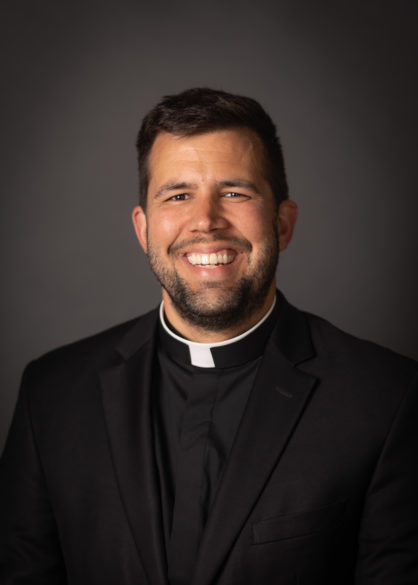
She recounted the comment to her friend in a letter and went onto write regarding the comment ‘that was all the defense I was capable of, but I realize now that this is all I will ever be able to say about it, outside of a story, except that [the Eucharist] is the center of existence for me; all the rest is expendable.’ (Excerpts from O’Connor’s letter cited in John Desmond’s 2002 article for Logos “Flannery O’Connor and the Symbol”)
Certainly, anyone can look to this anecdote for encouragement in making the Eucharist the center of his or her life, but I think about that statement when it comes to other truths of the faith that we hold as well, including the call to celibacy for most priests in the Roman Church.
As I’ve stated in this space before, the reason for celibacy is often assumed to be ‘so the priest has more time to minister and doesn’t have to care for his family.’ My response to that is O’Connor-esk: “if that’s the reason for celibacy, to hell with it.’
Priestly celibacy is a real Spiritual Fatherhood that a man must be called to. One of the reasons that seminary is so long is so a man can discern chaste celibacy alongside priesthood. Jesus says in Matthew 19 that some will be called to be unmarried “…for the sake of the kingdom of heaven. He who is able to receive this, let him receive this.” (Matthew 19:12b; NRSV2CE)
If my celibacy is a way to give me more time, it’s not working. I have less time now than I ever had, but that is because I am seeking to exercise a real fatherhood and a real spousal relationship that is lived out in my soul and in my day-to-day work and life.
Jesus actually taught this in the Gospel. That’s why I always cite these words when people try to give me an ‘out.’ They say things like: “I wish y’all could get married, because you’d probably have more help.”
I realize that these comments are made in support of me and my brother priests, but sometimes I respond in a way similar to O’Connor’s defense of the Real Presence. If the priesthood and the call to celibacy that I discerned in seminary is really all about efficiency and was not a true call to be a spiritual father, to hell with it.
I believe that priesthood can most fruitfully be lived out with a deep recognition that you were called into relationship with the church and into a true fatherhood for her people. Thankfully this was explained to me many times in many ways by many different formators in the seminary, and that work continues with our men currently in formation.
Thank you for your support of priests, and please encourage them to take ownership of the identity that Christ has called them to – they are spouses of the church, and they are true fathers of the People of God. Pray that our men in seminary discern well the call to celibacy, and that they courageously accept that call if, and only if, the Lord offers it.
– Father Nick Adam
For more info on vocations email: nick.adam@jacksondiocese.org.
The time to act is now
Kneading Faith
By Fran Lavelle
I was just at a regional conference where I spoke on the process moving forward from the Synod on Synodality. One of my friends asked me how it went. After a moment of reflection, I replied “not good.” She asked why I felt that it was not good. My response surprised even me. I truly feel like people are not ready to do the work that is required to achieve the things we say we want.
In our Synod listening we heard over and over the need for unity and healing. So much so that unity and healing is first among the issues we listed in our synthesis. However, when one addresses what unity and healing might look like in our post-pandemic church the enthusiasm for said unity wanes. The same holds true for taking politics out of the church. We heard repeatedly that politics should be removed from the pulpit. However, what many people really want to remove is the partisan politics of the party they oppose. Apparently, we are more than OK with hearing political rhetoric, as long as it aligns with our own perspective. Here’s the kicker, the teachings of the Catholic Church do not fully align with either conservative or liberal politics. That’s where Catholic Social Teaching comes into play.
“Catholic social teaching proposes a set of principles [Human Dignity, Solidarity, Subsidiarity] on which to form our conscience and then act in society. Because every life has value and is sacred, it should be protected by society. The principles of solidarity and subsidiarity mean people must participate in society.
To what end?
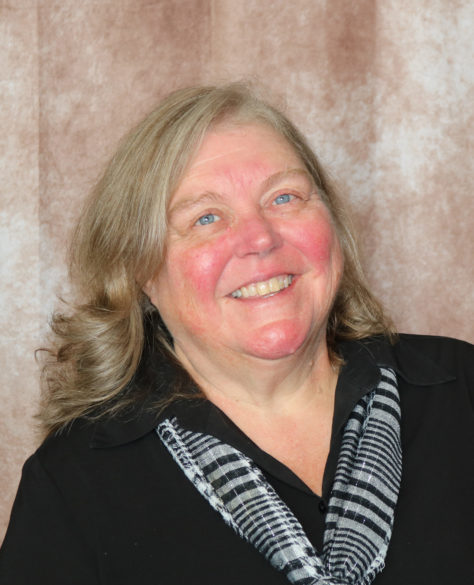
To provide criteria for forming our cultural, economic and political positions – based on the principles of Catholic social teaching and for the Common Good. The lessons of Catholic social teaching are always relevant. They provide guidance on how individuals can be better citizens. These lessons also guide social institutions in creating environments in which all can prosper (i.e., promote the common good).” – Catholic Social Teaching in Action
Speaking of partisan politics – both sides often fail to implement Catholic social teaching through their lives. And both run the risk of forgetting a key message of Catholic social teaching: “It is clear that no economic, social or political project can replace the gift of self to another … He who does not give God gives too little.” – Pope Benedict XVI
Clearly, we cannot cherry pick when to act and advocate for human dignity, solidarity and subsidiarity. Seeing the bigger picture calls us to greater accountability. For example, if one professes to be pro-life, that extends to ending the death penalty as much as ending abortion. Sometimes we do not see the inconsistencies in our thinking until we look at the big picture. Catholic Social Teaching allows us to see the bigger picture.
On the question of healing there were several areas identified that require reconciliation and healing. Chief among them were racism, annulments/marriage issues, LGBTQ and the sexual abuse crisis that still plagues the faithful. Out of the issues identified there is little if any leadership within the larger church to support meaningful healing.
If the Body of Christ that is the church is waiting for someone or something to come along that will advance healing in these important areas, we will be waiting for some time. If you see something, say something. If you say something, be willing to do something. How can you facilitate conversations and each out to those who feel rejected or invisible in the church? Supporting one another, no matter how difficult our journey, is the first step in promoting healing, reconciliation and unity.
The other major issues coming from our Synod listening involve catechesis and formation of children, youth and adults. All are worthy endeavors. All are important. All are attainable and achievable. Here’s the kicker, if we want better faith formation it will require that we as individual members of our faith community step up and do something. Perhaps everyone is not called to teach, but there are many ways we can support better catechesis and formation. As Catholics we often fail to invest in the young church. Every parish needs to have a budget for religious education and formation that extends from baptism through adult ed. Every parish should have a budget for youth ministry. An investment in the youth today will pay dividends today and far into the future.
Last but not least, was a call for formation opportunities for the laity. Jesus did not come to form the disciples to keep the work of the Gospel to themselves. Their commission was to go out and make disciples. Everyone has the responsibility to be a disciple. There are many formation opportunities available in the diocese to help you grow as a disciple. No matter what stage or what age, the offices of the Department of Faith Formation are here to help you produce great fruit from our synodal listening. We are only a phone call or email away.
(Fran Lavelle is the Director of Faith Formation for the Diocese of Jackson. She can be reached at fran.lavelle@jacksondiocese.org.)
We must recover those ‘recovering’ Catholics
FOR THE JOURNEY
By Effie Caldarola
As “I’m a recovering Catholic,” our contractor announces jauntily, apropos of what I can’t remember. I think we were trying to decide on flooring for the front deck.
It’s a phrase with which we’ve become familiar, so common that this guy we know only because he’s overseeing some basic repairs to our old house can throw it out casually.
Another common phrase in today’s parlance: “I was raised Catholic.” I can’t count the number of interviews with famous people in which I’ve read that statement. Often, it’s said with fondness. The people being interviewed are ascribing their beliefs in social justice, charity and right order to the years they spent at Mass or in a Catholic school classroom or gathered around the table for grace.
But let’s be clear, their comment implies, “I took the good part and left.” In many circles, to declare one is still a “practicing” Catholic is to admit to being old-fashioned, to still believing in Santa Claus, especially if Santa has been credibly accused of abuse. They’ve left that behind with the avocado appliances and shag carpeting of their childhood.
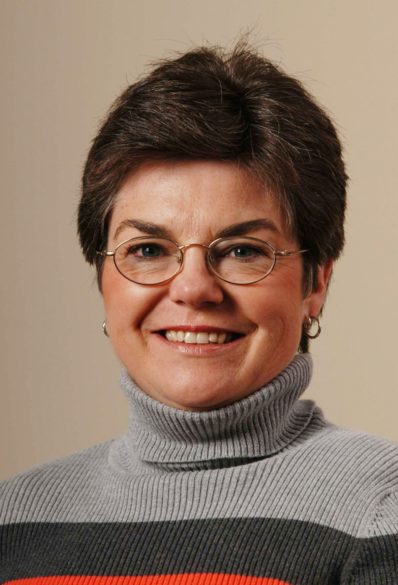
For those of us who still place their faith in this community of saints and sinners, it can feel lonely. Many people around me are not going to church at all, and some of the stalwart Catholics I knew from my youthful days as a Jesuit Volunteer and young wife and mother are dropping out or experimenting with Christian denominations.
I have a young friend who threw up his hands at the church because he saw our leadership failing to embrace Catholic social teaching. The abuse cover-up was the last straw.
“But what about the sacraments?” I asked. “Don’t you miss the Eucharist?”
His answer was vague. Those other things were very important to him. OK, those things are important to me, too.
But don’t you miss the Eucharist? Don’t you want to be part of the change, part of the synodal process?
At a book sale, I found a used copy of Henri Nouwen’s book, “Bread for the Journey: A Daybook of Wisdom and Faith.” This Dutch priest and theologian, who died in 1996, was a prolific writer. The book was published in 1997, before the abuse scandal hit the news.
Nevertheless, in his entry for Oct. 20, he writes, “Over the centuries the church has done enough to make any critical person want to leave it.”
He recounts “violent crusades, pogroms, power struggles, oppression, excommunications, executions, manipulation of people and ideas, and constantly recurring divisions.”
Whew. And he hasn’t even touched on more recent headlines.
But then he asks if we can believe “that this is the same church that carries in its center the Word of God and the sacraments of God’s healing love?”
He speaks of the human brokenness of the church, which presents the broken body of Christ to the world. Human promises are broken; God’s promise “stands unshaken.”
I love the church because I love the communion of saints. I love the sacramentals, the sacraments, the mystics and monasteries, the heroes from Teresa of Avila to Thea Bowman, from Ignatius of Loyola to Dorothy Day, from Francis of Assisi to Edith Stein. Would this cloud of witnesses want me to leave?
I wish that young man would stay. We need him. We need him involved in the conversation, we need him prodding his pastor and his bishop. We need him finding the promise among the brokenness of an imperfect church. We need the community of each other.
Peter’s plaintive words in John 6:68 echo. “Lord, to whom would we go?”
(Effie Caldarola writes monthly for OSV News.)
Catholics ‘must act’ for racial justice to honor MLK, says USCCB president
By OSV News
WASHINGTON – Catholics “must act” for racial justice, starting with personal conversion, to honor Dr. Martin Luther King Jr.’s struggle and eliminate racial injustices in society, the president of the U.S. Conference of Catholic Bishops stated.
Archbishop Timothy P. Broglio of the U.S. Archdiocese of the Military Services in his statement immediately referred to the call to action from Servant of God Sister Thea Bowman, one of six Black Catholic women and men proposed for sainthood.
“People keep saying, ‘Where’s the next Martin Luther King?’ We’re all called, I think. We’re called by our citizenship, by our membership in the human race. We’re all called to free ourselves and to free one another,” Sister Bowman said.
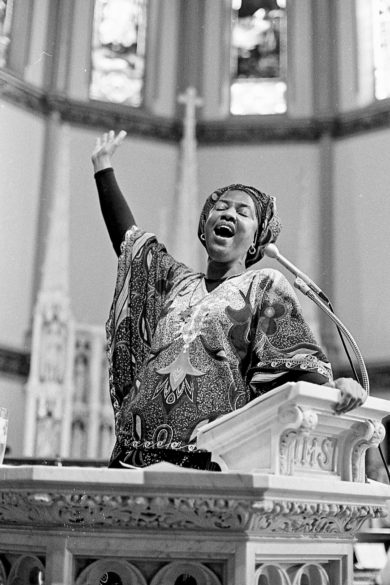
Archbishop Broglio noted that while society has made progress toward “a just society that leaves no one on the margins” in the 60 years since Dr. King’s “I Have a Dream” speech, nevertheless “much work remains.”
Dr. King, whose birthday is Jan. 15 but is celebrated on the following Monday as a federal holiday, led the civil rights movement until his assassination in Memphis, Tennessee, April 4, 1968. He was just 39 years old and would have turned 94 this year.
“Beyond remembering and quoting Dr. King today, we must act to address racial disparities in the criminal justice system, access to affordable housing and health care, and economic opportunities,” the USCCB president stated.
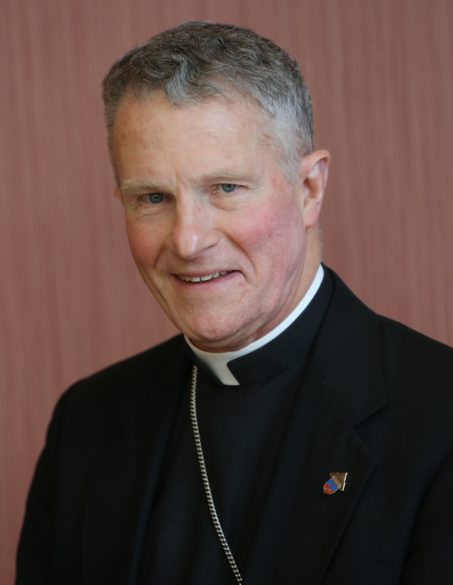
He noted the USCCB “continues to support policy changes in these areas of society,” and encouraged people to read about the USCCB’s policy work and efforts to overcome racism, as well as “ministry resources in working with and for Catholics of African descent.”
Archbishop Broglio pointed out Rev. King’s faith drove his civil rights work, and Catholics today must undergo conversion and look to the saints to undo unjust structures of racism in society.
“Remembering that Dr. King was guided first by his faith also challenges us to personal conversion. Unjust structures exist because personal sin persists,” he said. “As the late Pope Benedict XVI expressed, ‘To renew the church in every age, God raises up saints, who themselves have been renewed by God and are in constant contact with God.’ For models of lives transformed, we can always turn to the saints.”
Archbishop Broglio highlighted the USCCB’s efforts to advance the sainthood causes of “six inspirational African American men and women: Venerable Pierre Toussaint, Servant of God Mother Mary Lange, Venerable Henriette Delille, Venerable Augustus Tolton, Servant of God Julia Greeley, and Sister Thea Bowman.”
He said, “May their holy examples convert our hearts and our society, that we may achieve Dr. King’s dream of building a society where every person is recognized as a beloved son or daughter of God and treated with the justice and dignity that they deserve.”
Editor’s Note: To read about the USCCB’s Committee on Domestic Justice and Human Development, which works on the bishops’ domestic policy priorities, please visit: https://www.usccb.org/committees/domestic-justice-and-human-development/who-we-are.
For more information on African Americans and Catholic ministry, please visit: https://www.usccb.org/committees/african-american-affairs/timely-resources-ministry-catholics-african-descent.
For additional information on the USCCB’s efforts to overcome racism, please visit: https://www.usccb.org/committees/ad-hoc-committee-against-racism.
Further information on the lives of Black Catholic men and women up for sainthood can be found in the OSV book “Black Catholics on the Road to Sainthood”: https://www.osvcatholicbookstore.com/product/black-catholics-on-the-road-to-sainthood.
‘We are not yet done’: March for Life holds first national event after overturn of Roe v. Wade
By Kate Scanlon
WASHINGTON (OSV) – Tens of thousands of pro-life advocates descended upon the nation’s capital for the 50th March for Life Jan. 20 – the first national march since the overturn of the U.S. Supreme Court’s 1973 Roe v. Wade decision that initially prompted the annual demonstration.
Standing on the event stage at the National Mall, with the U.S. Capitol visible in the background, Jeanne Mancini, March for Life president, told attendees at a rally prior to the march that “the country and world changed” when Roe was reversed in June 2022. But she said the annual March for Life would continue in Washington until abortion is “unthinkable.”
“While the March began as a response to Roe, we don’t end as a response to Roe being overturned,” Mancini said. “Why? Because we are not yet done.”
The march took place on a sunny and unseasonably warm day in Washington. A headcount of attendees was not immediately available, as the National Park Service does not release crowd size estimates.
The national March for Life first took place in Washington in 1974 in response to the Roe decision legalizing abortion nationwide the previous year. The protest has taken place in Washington each year since, with a smaller-in-scale event during the COVID-19 pandemic in 2021.
The 2023 event was the first national March for Life since the high court’s June 2022 ruling in Dobbs v. Jackson Women’s Health Organization that overturned Roe and returned the matter of regulating or restricting abortion to state legislatures.
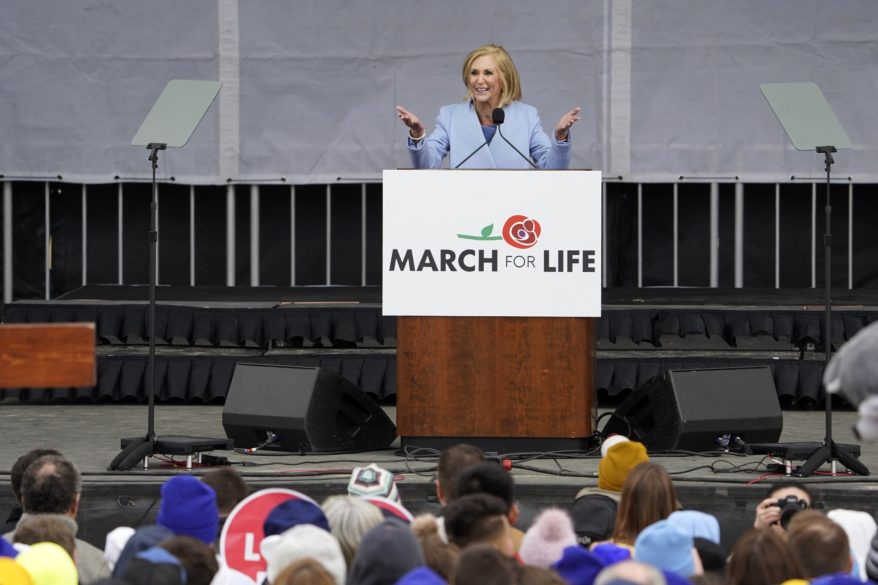
At the pre-march rally, the Christian band “We Are Messengers” performed, followed by a number of speakers, including Jonathan Roumie, known for his role as “Jesus” in the television series “The Chosen,” former Indianapolis Colts Head Coach Tony Dungy, Democratic Connecticut State Rep. Trenee McGee, and Gianna Emanuela Molla, the daughter of St. Gianna Beretta Molla. Canonized in 2004, St. Gianna gave her life for Giana Emanuela, choosing to move forward with her fourth pregnancy even after doctors discovered a tumor in her uterus.
Molla told the rallygoers that she thanks her “saint mom” for the gift of life. “I would not be here now with all of you if I had not been loved so much,” she said.
Roumie took a picture of the crowd behind him from the stage, telling marchers to tag themselves on social media, and quipping he is the “TV Jesus,” not the real one.
“God is real and he is completely in love with you,” he said, adding that each person is individually loved by God.
The rally also featured some lawmakers from the U.S. House of Representatives. Rep. Chris Smith of New Jersey, a Catholic Republican and co-chair of the Congressional Pro-Life Caucus, said at the rally, “Future generations will someday look back on us and wonder how and why a society that bragged about its commitment to human rights could have legally sanctioned” abortion.
“The injustice of abortion need not be forever, and with your continued work and prayers, it will not be,” Smith said.
Prior to speaking to the sea of pro-life marchers on the National Mall, Mississippi Attorney General Lynn Fitch, who argued the Dobbs case before the Supreme Court, told OSV News that “empowering women and promoting life” were the next steps post-Roe.
“Some of the things that we’re talking about in Mississippi and promoting legislation on are workplace flexibility options, particularly for mothers,” she said. “We lose young mothers because they don’t have any options. They don’t have that flexibility. We’ve got to have childcare. It’s got to be affordable, accessible and quality.”
Fitch said she wants to see the pro-life movement do “some heavy lifts” to push laws enhancing child support enforcement and reforming the adoption or foster care systems.
“(These systems) are failing our children; they’re broken,” Fitch said. “We’ve got to make those (changes) happen and put those children in these loving families.”
Speaking with OSV News at the march, Kristan Hawkins, president of the pro-life group Students for Life of America, said the next front of her organization’s activism will focus on fighting the spread of medication abortion. Hawkins said the pro-life movement should also focus on broadening the social safety net and its remaining goals at the federal level, such as stripping Planned Parenthood, the nation’s largest single abortion provider, of taxpayer funds.
“There is a lot for us to do as a nation, especially raising awareness among its citizens,” Isalyn Aviles Rodríguez, who came to the march from Miami, told OSV News. Rodríguez said she was motivated to march because “the nation needs to know that children are part of God’s plan from conception until natural death.”
As in prior years, the March drew teenage advocates for life as well. Angeline Moro, 14, from Trenton, New Jersey, attended the event to learn how to raise her voice in defense of the most vulnerable.
“We all need to have a chance to live,” Moro said.
At various events leading up to the march, pro-life advocates joined together in prayer and solidarity.
At the Jan. 19 opening Mass for the annual National Prayer Vigil for Life, the night before the march, Bishop Michael F. Burbidge of Arlington, Virginia, said in his homily that the pro-life movement has “much to celebrate” because Roe v. Wade “is no more.”
But, he added, a “new important phase” for the cause of life “begins now.”
“Our efforts to defend life must be as tireless as ever” not only to change laws but also hearts “with steadfast faith in the grace and power of God to do so,” said Bishop Burbidge, chairman of the U.S. Conference of Catholic Bishops’ Committee on Pro-Life Activities.
The event, held at the Basilica of the National Shrine of the Immaculate Conception in Washington, drew between 6,000 and 6,500 people, with most of the congregation filling the Great Upper Church. Dozens also viewed the Mass via screens in the lower level of the basilica.
Archbishop Christophe Pierre, apostolic nuncio to the U.S., read a message from Cardinal Pietro Parolin, Vatican secretary of state, issued on behalf of Pope Francis, who imparted his blessing on all those participating in the March for Life.
“His Holiness trusts that Almighty God will strengthen the commitment of all, especially the young, to persevere in their efforts aimed at protecting human life in all its stages, especially through adequate legal measures enacted at every level of society,” the message said.
The Mass was followed by a “Holy Hour for Life” at the basilica, which launched a series of Holy Hours of Eucharistic devotion throughout the night in dioceses across the country. Auxiliary Bishop Joseph L. Coffey of the U.S. Archdiocese for the Military Services celebrated Mass at 8 a.m. Jan. 20 to close the vigil.
Meanwhile, hundreds of teens and young adults from the Archdiocese of Washington gathered at the Cathedral of St. Matthew the Apostle for the Youth Mass of Celebration and Thanksgiving for Life, where homilist Father Robert Kilner of Solomons, Maryland, urged them to be “witnesses to life, witnesses to the truth that every life matters.”
“Pray and be confident that God can and will do great things,” he said. “Witness by the way you love your family, and especially the smallest, most helpless around you. Witness by your words in defense of the unborn, witness to God’s mercy, inviting everyone back to the joy of confession.”
Cardinal Wilton D. Gregory of Washington, the principal celebrant of the Mass, said it was “a special joy for me to be able to celebrate this Eucharist with you, our young, youthful, joyful, happy church.”
The thousands of attendees at these events then streamed into the National Mall, where they assembled at the noon rally and prepared to begin marching an hour later.
With the overturn of Roe, organizers had planned for a reworked march route, resulting in a new final destination: the East Front of the U.S. Capitol, symbolizing the movement’s new goals. However, restrictions on the use of sticks for signage put in place by the U.S. Capitol Police after the Jan. 6, 2021, riot at the Capitol resulted in the route instead passing by the West Front. For the 50th time, the national march ended in the same spot: before the steps of the U.S. Supreme Court.
(Kate Scanlon is a national reporter for OSV News covering Washington. Julie Asher, Gina Christian, Marietha Góngora and Kurt Jensen contributed to this report.)
Papal calendar: 2023 holds important events for Pope Francis
By Cindy Wooden
VATICAN CITY (CNS) – Pope Francis will soon pack his bags for his first foreign trip of 2023, a year that promises to be as busy as ever.
The pope, who celebrated his 86th birthday Dec. 17, can move quickly – in a wheelchair – and keeps saying in interviews that a functioning head and heart – not a well-functioning knee – are essential to the exercise of the papacy.
And, so, his appointment book for 2023 is starting to fill up, although he usually agrees to appointments with the caveat of “God willing.”
Several events are already inked in:
– A pastoral visit to violence-torn Congo Jan. 31-Feb. 3, followed by an ecumenical pilgrimage for peace to South Sudan Feb. 3-5 with Anglican Archbishop Justin Welby of Canterbury and the Rev. Iain Greenshields, moderator of the Presbyterian Church of Scotland.
– Pope Francis celebrates his 10th anniversary as pope March 13.
– He is scheduled to join perhaps 1 million young people from around the globe for World Youth Day Aug. 1-6 in Lisbon, Portugal.
– And the first session of the world Synod of Bishops meeting on “synodality” is scheduled for Oct. 4-29 at the Vatican.
His constant pleas for peace in Ukraine will not end until the war does.
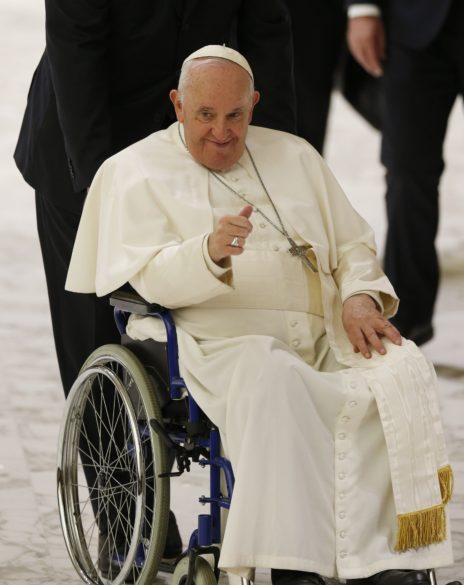
And while Pope Francis indicated Dec. 21 that he had reached, or at least was reaching, the end of a series of general audience lessons about spiritual discernment – what it is, how it is done and how the results are judged – his emphasis on teaching Catholics how to listen to the Holy Spirit when making decisions individually or communally will continue as the synod process does.
In October, saying he did not want to rush the process of discerning how the Holy Spirit is calling the church to grow in “synodality,” the pope announced that the assembly of the Synod of Bishops would take place in two sessions. The gathering scheduled for 2023 is only the first session.
Having published his constitution reforming the Roman Curia in June, Pope Francis is expected to make some changes in the top positions of Curia offices in the coming year.
The normal retirement age for cardinals and bishops working in the Curia is 75, but the pope has often kept cardinals who are prefects of dicasteries in place beyond their 75th birthdays.
The two cardinals likely to retire in 2023 are: Cardinal Luis Ladaria, prefect of the Dicastery for the Doctrine of the Faith, who will be 79 in April and has been in office since 2017; and Cardinal Mauro Piacenza, head of the Apostolic Penitentiary, a Vatican tribunal, who turned 78 in September and has led the office since 2013.
Four other cardinals continue to serve past the age of 75. Cardinal Michael Czerny, prefect of the Dicastery for Promoting Integral Human Development, celebrated his 76th birthday in July. Cardinal Joao Bráz de Aviz will turn 76 in April. Cardinal Kevin J. Farrell, prefect of the Dicastery for Laity, the Family and Life, turned 75 in September. Cardinal Marcello Semeraro, prefect of the Dicastery for the Causes of Saints, celebrated his 75th birthday Dec. 22.
In 2023 Pope Francis also will hear continuing calls to address the clerical sexual abuse scandal and, especially, to ensure greater consistency in dealing with abusers and greater transparency in how the Vatican has handled the cases.
The case of Jesuit Father Marko Rupnik, the Slovenian artist, will continue to make headlines; in late December the Jesuits asked victims to come forward and published a timeline that showed the Vatican’s doctrinal office in May 2020 confirmed the priest had incurred automatic excommunication for granting sacramental absolution to a woman with whom he had had a sexual relationship. After he formally recognized his abuse and expressed repentance, the excommunication was lifted the same month.
In 2021 another allegation of abuse was made by several women who belonged to the Loyola Community he served as a spiritual adviser in Slovenia; the doctrinal office ruled that the statute of limitations had passed and closed the case. News of his previous excommunication came out only after the second case was dismissed, raising questions about why the statute of limitations was not waived and about whether Pope Francis knew about and was involved in lifting the previous excommunication.
Returning to Rome from Bahrain in November, Pope Francis told reporters that over the past 20 years, the Catholic Church had made huge efforts to stop hiding abuse cases and simply shuffling abusive priests to new assignments – “an ugly habit,” he said – and “we are moving forward.”
(Follow Wooden on Twitter: @Cindy_Wooden)
